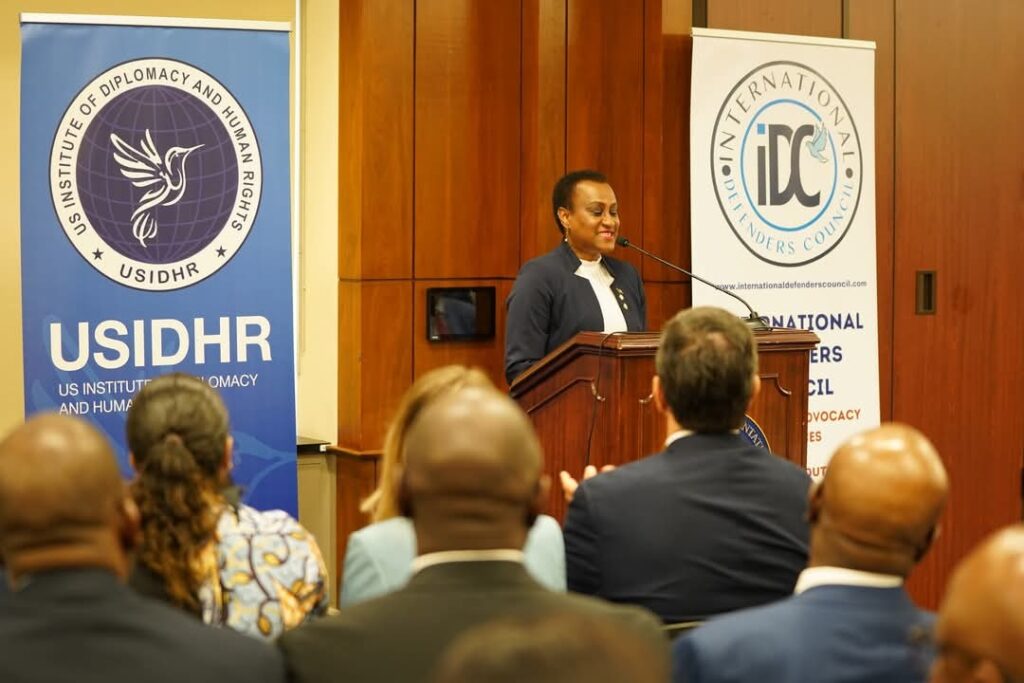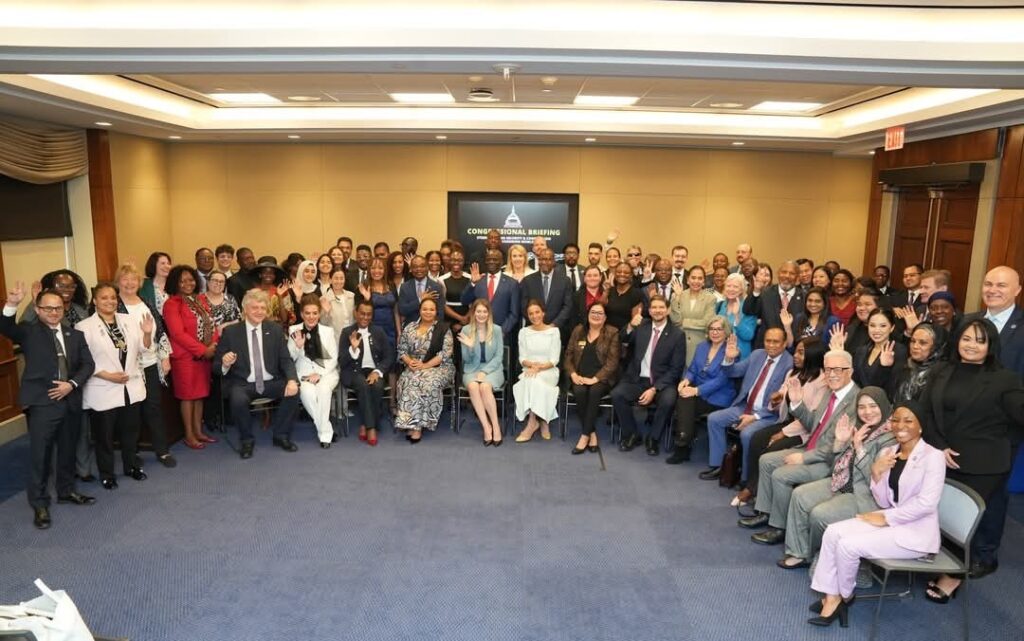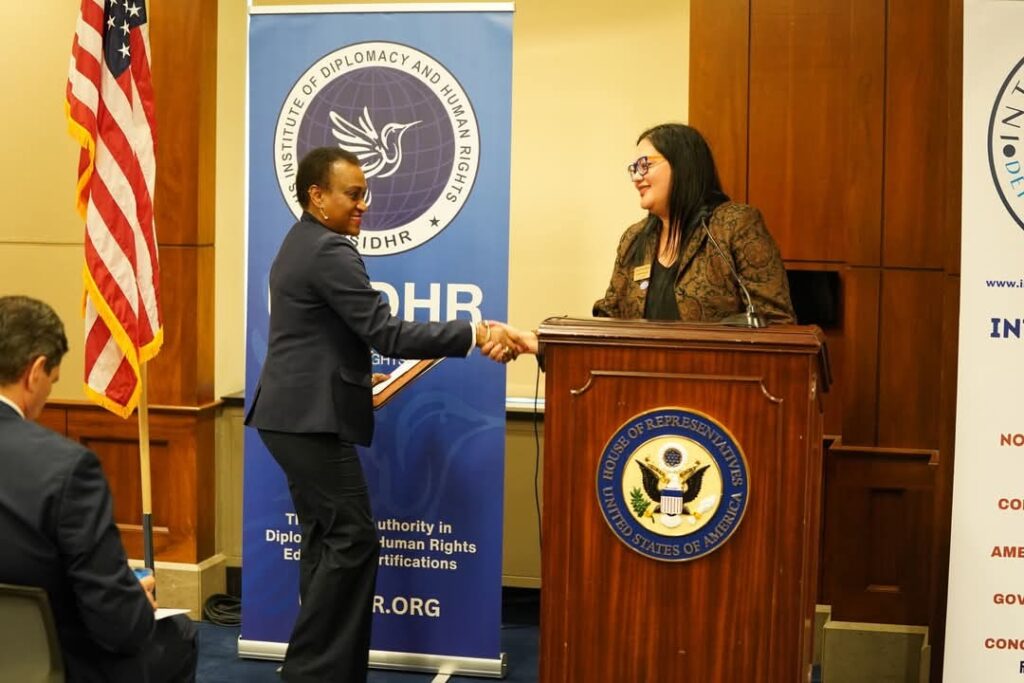Washington, D.C, May 20, 2025 — Ambassador Jacinth Henry-Martin of Saint Kitts and Nevis delivered a powerful address at the Second Annual Congressional Briefing on “Diplomacy and Global Leadership: Strengthening Security and Cooperation in a Changing World,” held at the United States Congress and hosted by the U.S. Institute of Diplomacy and Human Rights (USIDHR) in collaboration with the International Defenders Council.
In a social media statement, USIDHR described the gathering as more than an event: “This isn’t just a meeting—it’s a movement.”
This landmark event united over 53 nations in one historic moment and one united mission, affirming that diplomacy remains a cornerstone of global security and sustainable cooperation.
Among a distinguished roster of diplomats, congressional leaders, and international policymakers, Ambassador Henry-Martin’s speech emerged as a defining voice advocating for inclusive, principled, and future-focused global leadership.
In her compelling remarks, Ambassador Henry-Martin redefined global leadership as a force not of dominance but of values, inclusion, and collaboration. “Global leadership today must be defined not merely by size, military strength, or economic power, but by vision, values, and the ability to build coalitions for good,” she stated, urging nations to lead through listening and collective progress.

Her Excellency Jacinth Henry-Martin, Ambassador of Saint Kitts and Nevis to the United States of America presenting at the Second Annual Congressional Briefing on Diplomacy and Global Leadership 2025.
Emphasizing the distinct perspective of Small Island Developing States (SIDS), Her Excellency highlighted how countries like Saint Kitts and Nevis exercise daily resilience and principled diplomacy to navigate complex global challenges, from climate vulnerability to economic transformation.
“For small states, diplomacy is not just a tool—it is a lifeline,” Ambassador Henry-Martin noted. “Saint Kitts and Nevis builds bridges, across the oceans – Bridges of friendship, alliances, diplomatic relations, —engaging partners near and far, respecting sovereignty while advancing shared goals.”
She emphasized that the voice of every nation, no matter its size, matters in shaping a just and cooperative world.
Addressing the importance of education as a national and global imperative, the Ambassador showcased Saint Kitts and Nevis’ commitment to free universal education as a gateway to empowerment and generational upliftment. “Education is free in Saint Kitts and Nevis for every child from age 5 to 16. It has lifted the veil of generational poverty born of degrading systems and enabled generations of our people to contribute meaningfully to national development and represent our values on the world stage,” she affirmed, underscoring how investing in people fuels innovation, justice, and progress.
Ambassador Henry-Martin also issued a call for diplomacy to serve as the bedrock of international security, particularly in a world facing overlapping challenges such as climate change, pandemics, and migration. “Our diplomacy is quiet but powerful, rooted in the conviction that every nation, regardless of size, has a voice that must be heard and respected,” she declared.

Attendees of the Second Annual Congressional Briefing on Diplomacy and Global Leadership 2025.
The briefing’s keynote address was delivered by Her Excellency Thérèse Kayikwamba Wagner, Minister of Foreign Affairs of the Democratic Republic of Congo (DRC), who traveled to Washington, D.C. for the event. Her remarks focused on the urgency of preventive diplomacy and strengthening the long-standing ties between the DRC and the United States. “We must act before conflict erupts, not after the damage is done,” Minister Wagner stated, emphasizing diplomacy as a visionary act of peace and progress.
Representatives and dignitaries from 53 countries participated in the event, including Austria, Bahamas, Bahrain, Belgium, Belize, Colombia, Egypt, Fiji, Ghana, Jamaica, Malaysia, Nigeria, Panama, Saint Lucia, Singapore, Uganda, Zambia, and the United States, among others. Their presence signaled a shared commitment to multilateral engagement and global solidarity in the face of today’s pressing global challenges.
The Second Annual Congressional Briefing stood as a testament to the power of principled diplomacy and united leadership. Its purpose was clear: to elevate voices that champion cooperation, empower nations regardless of size, and build a world anchored in security, inclusion, and human dignity.



